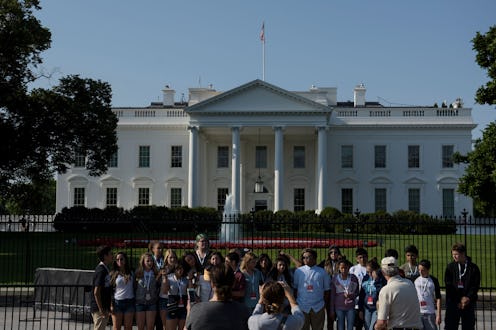News
D.C. Primary Will Award 20 Democratic Delegates
The final primary election of 2016 will take place on June 14 in Washington, D.C., as Democratic voters head to the polls for one last showdown between Hillary Clinton and Bernie Sanders. By that time, most Americans will probably already consider Clinton the nominee — she may even claim the title herself — but the District of Columbia's 45 delegates could still factor into Sanders' plan for a contested convention. That's, in part, because D.C.'s Democratic primary isn't winner-take-all.
The Democratic Party, as a rule, does not maintain winner-take-all primaries. Instead, Democratic delegates are allocated state-by-state on a proportional basis. Candidates receive pledged delegates based on their share of a state's primary vote. In other words, it matters less that a candidate wins a majority of the vote in a given state than how much of that vote the candidate receives. In states where either Clinton or Sanders has won, but by a very narrow margin, the candidates have left the state with virtually comparable delegate hauls.
D.C.'s Democratic primary will allocate 20 pledged delegates. Those delegates will be awarded to Clinton or Sanders based on the percentage of the vote they each receive at the polls. According to the District's Democratic Party, a candidate needs to win just 15 percent of the popular vote in order to earn a delegate.
For her part, Clinton could benefit from the endorsements of the D.C. mayor and much of the D.C. council. She could also benefit from the momentum that her campaign has had throughout much of the primary race so far. Not to mention, a bit of controversy arose back in April when the D.C. council had to alter its own rules to even allow Sanders onto the District's ballot after what seemed like an administrative mix-up.
Still, the majority of D.C.'s Democratic delegates won't be allocated on primary day. The District will send 25 superdelegates to the Democratic National Convention in July, and those delegates don't officially pledge their allegiance until the first vote at the convention. Sanders has criticized his party's superdelegate system throughout much of the primary race, but he turned his focus to them in early June when he signaled his desire for a contested convention.
After months of primaries, caucuses, and debates, it seems fitting that the Democrats' final battle at the polls will take place in the nation's capital. If Sanders has his way, it won't be the final battle of the Democratic race, though. That would happen in July in Philadelphia, at his party's convention.
